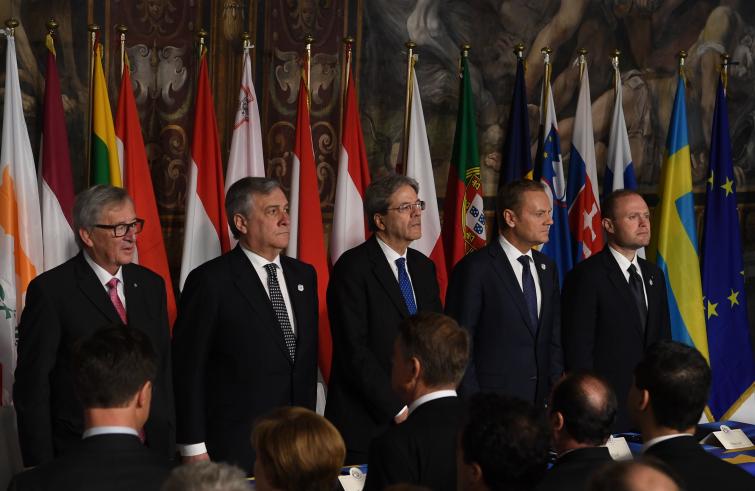
Europe is thriving and she intends to continue to thrive. United and anchored to the principles that in the course of history enabled her to become a frame of reference for peace and democracy worldwide. Europe intends to continue to exist, but she is aware that it will require restoring citizens’ confidence and passion, rekindling a relationship based on esteem, which withered in the past 60 years of history. This is the message that emerges from the celebrations held in an atmosphere of deep solemnity marking the 60th anniversary of the Treaties of Rome and from the “Declaration” that the 27 European Union leaders signed one by one in the Orazi and Curiazi Hall of Rome’s Capitol Hill, the same Hall where on March 25, 1957 the founding fathers ushered in the European adventure.
The UK is the great absent a sign and wound of a Europe that said “NO”, that over the years lost her credibility in people’s hearts. These are difficult times for the EU, where populist currents gain grounds along with border closures and new walls. Migratory inflows from Countries at war and from developing Countries raise concerns, while terror attacks against the beating hearts of the most important capitals of Europe contribute to the spread of a climate of suspicion.
However – states the Rome Declaration – Europe intends to continue facing these challenges “together.” There is no alternative:
“Standing together is our best chance” to “defend our common interests and values.”
With the Rome Declaration EU leaders pledged to stay committed to four concrete goals that give new impetus to the European programme of the founding fathers, projecting it towards the young generation and towards the future. The document speaks of a “secure” Europe, united in the fight against terrorism and organized crime. A ’“prosperous and sustainable” Union, which “generates growth and jobs.” A ’“social Europe”, which fights “unemployment, discrimination, social exclusion and poverty.” A Union where young people “can study and find jobs across the continent”; and finally, a “stronger Europe on the global scene”, promoting stability and prosperity “in its immediate neighbourhood to the east and south, but also in the Middle East and across Africa and globally.”

The absence of British premier Theresa May, the election campaign in France of Marine Le Pen, the protests against Europe scheduled on this very day, are challenges – said Italian MP Paolo Gentiloni – which show “that history is far from over”.
A sincere mea culpa: “Europe – Gentiloni acknowledged – has registered too many delays” in tackling migration, economic growth and job creation.
Unfortunately it stopped, stumbling over procedures and regulations while the world was proceeding at a very fast pace, which triggered a crisis of rejection. “This is the message of today’s celebrations – Premier Gentiloni said on behalf of all the leaders -: we have learnt the lesson. The Union chooses to make a fresh start”, which means restoring “the hope of our fellow citizens.”
The President of the EU Council Donald Franciszek Tusk, equally turned to all those who have stopped believing in the European project. He did so by sharing his personal experience in Poland at the time of the Iron Curtain, when dreams of freedom were forbidden.
To destroy peace and democracy – Tusk warned – “is very easy. It takes just a moment.”
“We can only rise to the challenges together”, underlined the President of the European Commission, Jean-Claude Juncker, who added: “It’s only by remaining united that we can pass on to future generations a more inclusive, firmer, stronger and more generous Europe, at home and in the rest of the world.” Antonio Tajani, President of the European Parliament, speaking to journalists took a solemn commitment before European citizens: “The European Parliament has the responsibility to ensure– and, starting tomorrow, the European Parliament will start to ensure – that what we have put into writing may become concrete action.”













